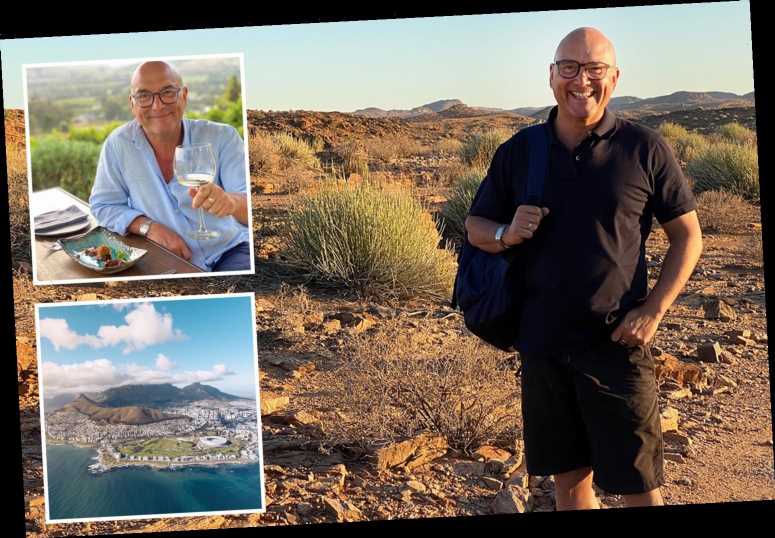MASTERCHEF judge and TV presenter Gregg Wallace is delighting TV audiences with his tour of South Africa’s best-loved landscapes and experiences, as well as its glorious food.
The new six-part series for ITV sees him go on safari in Amakhala, visit Cape Town, Augrabies Falls in the Kalahari Desert, the Whale Coast, Soweto in Johannesburg and the Garden Province — aiming to get a taste of the real South Africa.
Along the wild coast, on safari, through vast savannahs and into the cities, Gregg discovers the flavours this diverse country has to offer — from the winelands around Cape Town to an Afrikaans braai in the Kalahari Desert at sunset, Soweto’s street food stalls selling fat cakes, and traditional hearty dishes like bobotie.
Gregg also discovers South Africa’s famous wildlife — coming face to face with sharks and helping care for wild leopards and African penguins — and immerses himself in the country’s rich culture and tradition, new and old, as he journeys across the nation to gain a vivid insight into the country.
Below, Gregg describes his incredible journey through the country.
What would you say to viewers curious about visiting South Africa?
Please go! Let me tell you from a food and wine point of view, you will not get that quality of food and wine at that price anywhere.
A top end meal, three courses, in the smartest of hotels will cost you about £20. Go out and get a really good curry for about £3. And the wines are just exceptional.
A safari is just a magical thing, the winelands in South Africa are beautiful.
You can go into Soweto, speak to the people, and look at life carrying on in a very different way than you are used to.
I would say that if you’ve got the time, please also go up and visit the Kalahari.
You’re renowned for being a foodie – what was the best dish or drink you tasted while in South Africa?
I tell you what, you won’t understand a barbecue until you’ve eaten with the South Africans around a braai.
I hate barbecues in the UK, they’re always put together by people who don’t cook. Out there, you won’t believe the quality.
I saw someone baking a cake on a barbecue. They have got to be seen to be believed.
On their braais, they’ve got bits of lamb’s liver wrapped in fat, called skilpadjies, that are stunning. I just could not leave them alone, I mean, they properly make your fingers sticky.
Actually the best food might have been fat cakes in Soweto — really really cheap, they’re like fried dough balls and they come with different dips.
I had a tuk-tuk driver, and we sat there with three of his friends munching on these dough balls into these chili dips and the memory of that is still with me. Really good.
They also have potjies, a South African stew done over the fire. You’ve got to try that.
You can also try springbok, alligator and ostrich steaks — all beautiful, really lean meats.
What did you learn making this series?
I learned that South Africa is the most diverse country I have ever seen. The diversity is just striking. The food, the people, the culture, the look and the feel, for that all to be one country.
To be in the winelands of the Cape, eating fine food in really smart surroundings, to then be eating incredible street food in Soweto.
To then be in the heat of the Kalahari Desert, and then with the Indian population near Durban, and to find a big Muslim community in Cape Town, with street food, it just kept on surprising me over and over again.
And you think, this is all one nation — how can it be so different?
Which of the places you visited was your favourite?
My favourite was the Kalahari Desert, which has the absolute beauty of a wilderness. The pink Kalahari — the sands are red — with just one lush strip where the Orange River runs through the middle of it.
It’s stunningly desolate, and life is just clinging on in the middle of this desert, to a fertile strip on either bank of this river. Incredible. As you fly over it, it’s like you’re looking down on a green zip in a massive red pullover.
What experience had the most impact on you in this series?
Spending time in Soweto, and looking at the issues, and experiencing the poverty first-hand, had an enormous impact.
I was brought up in a council house in South East London — I didn’t have a privileged or wealthy upbringing — but looking at the scale of the problems there just left me dumbfounded.
Is there a secret you can tell us from behind the scenes of filming?
At a place called the Oyster Box, a beautiful hotel near KwaZulu-Natal, this sign on the wall, right next to the beach, said, “Be careful for your personal belongings, monkeys may drop in.”
That was different to the usual signs you get in London.
GOT a story? RING The Sun on 0207 782 4104 or WHATSAPP on 07423720250 or EMAIL [email protected]
Source: Read Full Article








